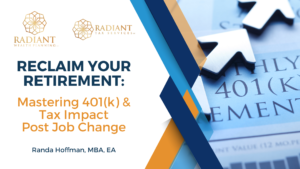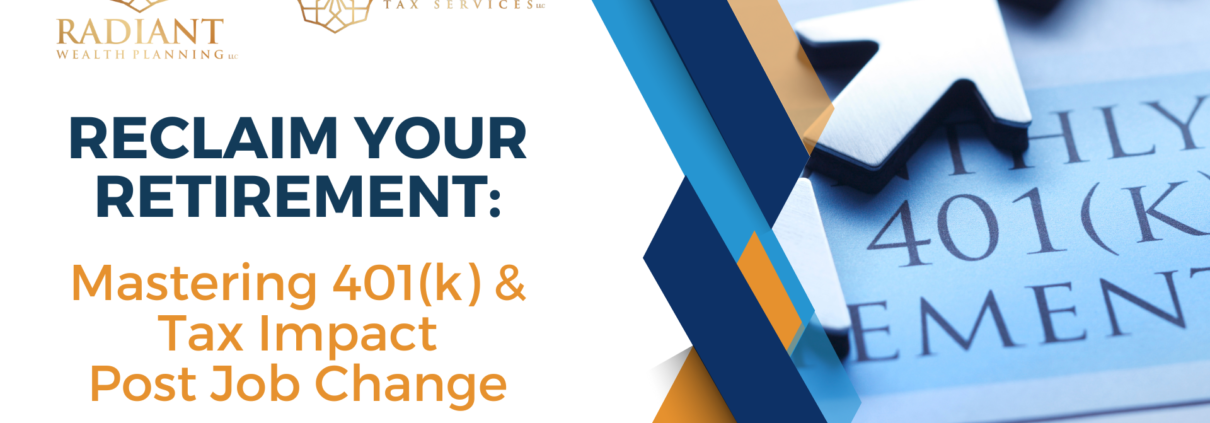Navigating Your 401(k) After Leaving Your Job

Common Questions Answered by RADIANT Wealth Planning LLC and RADIANT Tax Services LLC
Introduction
Welcome to RADIANT Wealth Planning LLC and RADIANT Tax Services LLC, your trusted partners in California Financial Planning and Tax Services. We understand that managing your 401(k) after leaving your job can be a complex task filled with questions and concerns. In this blog post, we’ll address some of the most common 401(k) questions, shedding light on important topics that can impact your financial future. Our expert, Randa Hoffman, MBA, EA, recently hosted a webinar where she discussed these questions in detail. Let’s dive in!
- Can I Still Contribute to My 401(k) After Leaving My Job?
Once you leave your job, whether it’s to start your own business or for any other reason, you can no longer contribute to your previous employer’s 401(k) plan. This is because 401(k) contributions are tied to your employment with that specific company. However, there are alternative options available. You can open an Individual Retirement Account (IRA) or consider a solo 401(k) if you’re self-employed. These options allow you to continue saving for retirement, albeit with different contribution limits.
- Can I Take a Loan from My 401(k) Before or After Leaving My Job?
Taking a loan from your 401(k) depends on your employer’s policy. If your current employer allows it, you can take a loan while you’re still employed. However, once you leave the job, you can no longer take a loan from that 401(k) account. The implications of taking a loan can vary, so it’s essential to understand your specific plan’s rules and potential consequences.
- What Happens If I Have an Outstanding Loan from My 401(k) After Leaving My Job?
If you leave your job with an outstanding 401(k) loan, you’ll receive notice from your financial institution. You typically have 60 days to pay off the loan. Failure to do so can result in the outstanding balance being considered a cash distribution, which may have tax implications. It’s crucial to consult with a financial advisor to make informed decisions in such situations.
- Are There Tax Implications When Changing Jobs or Retiring in a Different State?
Changing jobs and moving to a different state can have varying tax implications. On the federal level, changing jobs or moving to a different state generally doesn’t impact your retirement savings directly. However, state income tax can differ significantly from one state to another. For example, if you retire in a state with income tax, withdrawals from your retirement accounts may be subject to state taxation. Planning your retirement location carefully can help minimize these potential tax burdens.
- How Can I Manage My Retirement Savings Effectively After Leaving Multiple Jobs with Different 401(k) Plans?
Managing multiple 401(k) plans from different employers can be challenging. You have the option to roll over each 401(k) into a single IRA as you leave each job. Alternatively, if you haven’t done that, you can consolidate them into a single IRA at a later date. Consult with a financial advisor for guidance on the best approach, as this can streamline your retirement savings management.
- I Have Company Stock in My 401(k). How Should I Handle This When I Leave?
If you hold company stock in your 401(k), it’s often kept in a separate brokerage account, not within the 401(k) itself. When you leave your job, you can leave the company stock in that brokerage account or transfer it to another brokerage account. It’s important to note that you can’t place company stock into a retirement account due to differing tax treatment.
- Are There Specific Deadlines or Timeframes for Transitioning My 401(k)?
In most cases, there aren’t strict deadlines for transitioning your 401(k) after leaving your job. However, there are exceptions, such as early withdrawals before age 59 and a half. Consulting with a financial advisor is crucial, especially if you fall into this category, as they can provide valuable insights and help you avoid penalties.
Conclusion
Navigating your 401(k) after leaving your job can be a complex journey, but with the guidance of RADIANT Wealth Planning LLC and RADIANT Tax Services LLC, you can make informed decisions to secure your financial future. Don’t hesitate to reach out to our expert team for personalized assistance and guidance tailored to your unique circumstances. Start planning today to ensure a RADIANT financial future tomorrow.
Contact us now for expert advice and support on managing your 401(k) and securing your financial future!






